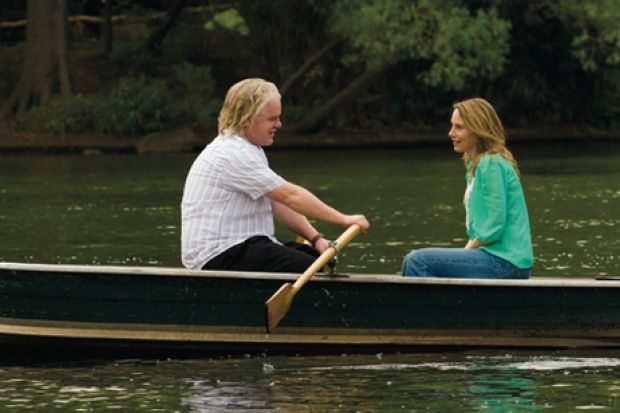Jack Goes Boating
Directed by Philip Seymour Hoffman
Starring Philip Seymour Hoffman, Amy Ryan, John Ortiz and Daphne Rubin-Vega
Released in the UK on 4 November
"Whenever there's something good, it fucks up!" You can't help feeling for the title character of Jack Goes Boating (played by Philip Seymour Hoffman) as he screams at his friends and locks himself in the bathroom: we've all felt like that at some point.
Adapted by Robert Glaudini from his own play, Jack Goes Boating offers a glimpse into the lives of four New Yorkers: Jack and Clyde (John Ortiz), who drive stretch limos for a living; and Connie and Lucy (played by Amy Ryan and Daphne Rubin-Vega), who work for an undertaker. It is an ensemble piece on a small scale, with New York City as its fifth character. Not dependent on sex or violence (although there is some drug-taking), it feels agreeably old-fashioned, demanding of its audience only that we engage with its characters' emotions.
Jack is an eccentric loser. Fortyish, unmarried and forever without a girlfriend, he appears to have been hollowed out by life, his sole consolation being the music of Bob Marley, his enthusiasm for which has prompted a half-hearted attempt to sprout dreadlocks. When he is introduced to Connie, everything changes. On their first meeting she says she wants to go boating with him in the summer, and Jack realises that he must learn to swim.
All right, this isn't Star Wars, but it's none the worse for that. The role of Jack is sensitively performed by Hoffman, who paints a credible portrait of a man whose failure to find a companion in life is explained by an inability to overcome chronic shyness. The other three actors are equally impressive. The film's refusal to play up to the standard clichés either of the New York film or of the romance lead to a restrained delivery. That none of the characters, particularly Connie and Jack, are played by actors considered good-looking by conventional standards is one reason why it works so well. It is good also to see Brooklyn and Manhattan locations that are new to film.
Jane Austen once commented that her portraits of society were etched on two-inch-wide pieces of ivory; something similar might be said of Jack Goes Boating. Its trick is to keep its ambitions in check. Most of its scenes are two-handers; its characters are unremarkable, "normal" people; and what they say sounds like vernacular: "Yeah, fuck"; "Reggae is mostly positive"; "Maybe a little goodnight kiss? You know, nothing overwhelming."
"Nothing overwhelming" could be the film's motto. Except that, in the end, a film that does not set out to mimic Battleship Potemkin is thought-provoking and, within its constrained parameters, moving. It asks some intriguing questions about how relationships get started and how they go wrong. It shows us the effects of betrayal and explores the long-term consequences of infidelity. It also describes accurately what it feels like to believe in someone. Most of all, this film is about our ability to idealise - whether the object is to swim perfectly, to cook the perfect meal, or to take someone we love on a boating expedition.
As director, Hoffman has executed an excellent cinematic adaptation of the stage play on which this film is based, with few visible traces of its theatrical origins. Some might accuse him of caution - but in truth, this is an adventurous piece, willing to adopt the unfashionable strategy of staying close to a handful of characters and charting the course of their emotional lives over a period of a few months. Technically, too, it has some surprises up its sleeve in its inventive use of music and its visual portrayal of Jack's imagined proficiency underwater.
Jack Goes Boating has taken more than a year to cross the Atlantic, probably because it grossed barely $500,000 (£313,000) in the US. That tells you more about the impoverishment of a culture in which only films containing special effects have any chance of getting into the multiplexes than it does about the quality of Hoffman's first film as director. Jack Goes Boating may not make it into UK multiplexes, but if it reaches a cinema near you, don't hesitate to see it.
Register to continue
Why register?
- Registration is free and only takes a moment
- Once registered, you can read 3 articles a month
- Sign up for our newsletter
Subscribe
Or subscribe for unlimited access to:
- Unlimited access to news, views, insights & reviews
- Digital editions
- Digital access to THE’s university and college rankings analysis
Already registered or a current subscriber? Login
